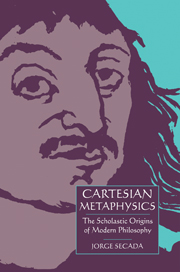Epilogue
Published online by Cambridge University Press: 22 September 2009
Summary
Descartes was born at the end of the sixteenth century when the humanist revolution of the Renaissance and the Late Scholastic revival which accompanied it were coming to an end. At the time of his early schooling, Galileo and Johannes Kepler had already laid the foundations of modern physics; and the new secular philosophies had already started displacing the inheritance of the School. Yet his education, as much as it was up-to-date, impressed on him the continuity of his circumstances with earlier times. He had a conservative bent and his upbringing was morally and socially traditional. Though intellecually progressive, his schooling was in the hands of men devoted to the preservation of the wisdom of St Thomas and the Doctors of the Church. It was from within such a milieu that he conceived his revolutionary philosophic and scientific project. By the end of his life, however, that world was a living corpse. Though he, as much as anybody, contributed to its demise and to his personal alienation from what was left of it, he was a stranger in the new surroundings. The early hope and enthusiasm gave way to a certain melancholy.
In May 1648 Descartes left Holland and travelled to Paris for the last time in his life. Shortly after arriving he wrote to Pierre Chanut that
this air [of Paris] disposes me to entertain chimeras instead of philosophical thoughts. I see here so many persons that go wrong in their opinions and calculations, that this seems to me a universal malady. […]
- Type
- Chapter
- Information
- Cartesian MetaphysicsThe Scholastic Origins of Modern Philosophy, pp. 265 - 269Publisher: Cambridge University PressPrint publication year: 2000



